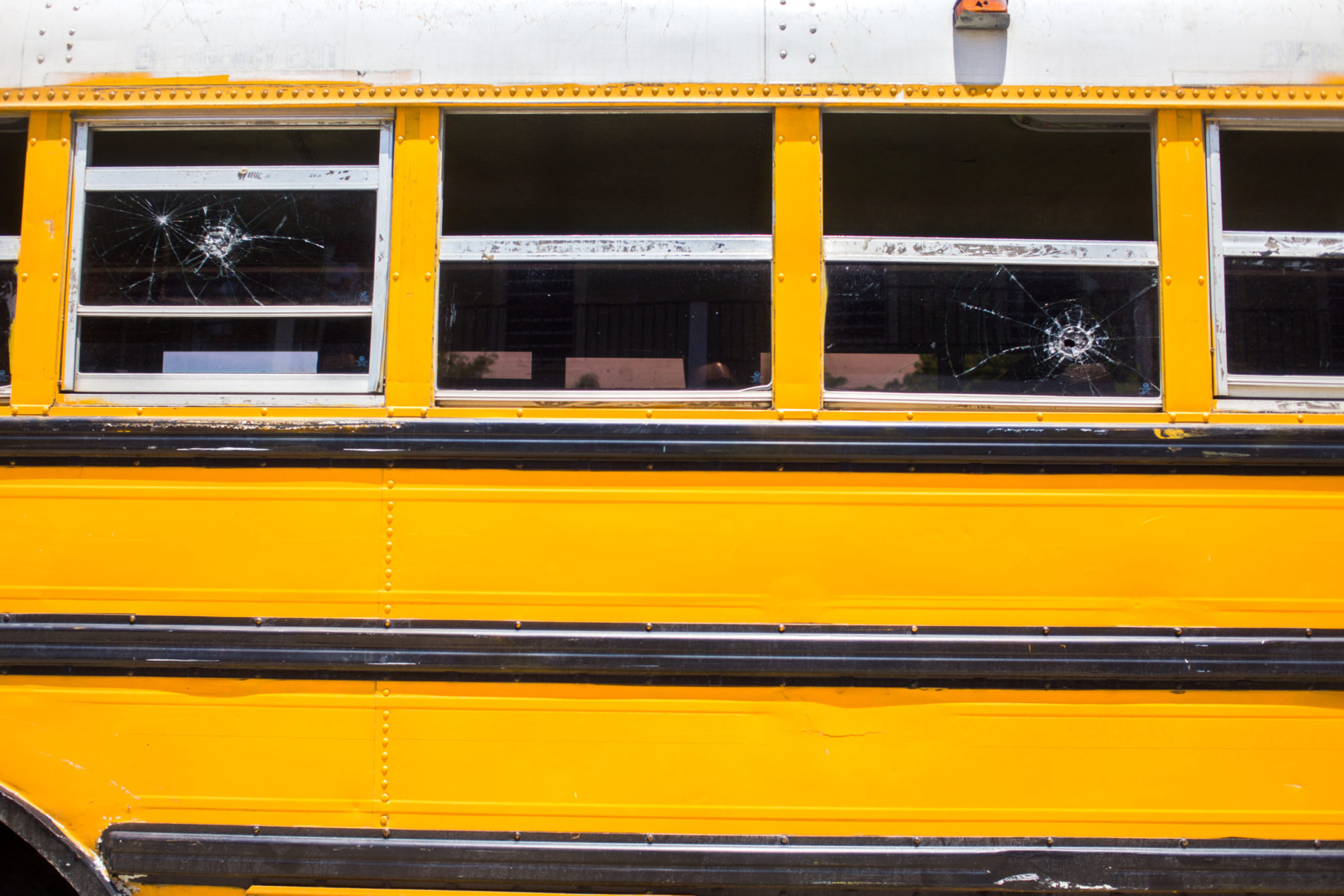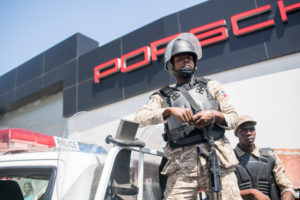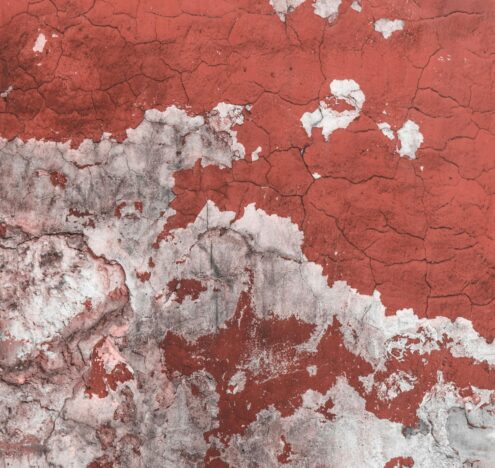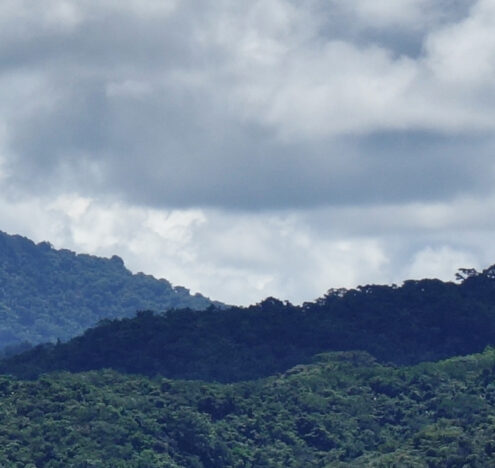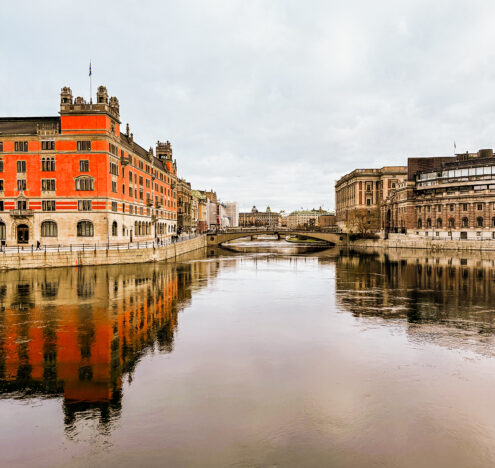For more than a month, Charlotin Richardson has been moving between a hotel, his sister’s, and a friend’s home for refuge, unable to return to the metropolitan sprawl of Croix-des-Bouquets where the notorious gang 400 Mawozo operates. When 61-year-old Richardson describes his situation, he recites a Haitian proverb to convey that by running from one bad thing he has landed in a worse situation.
Kouri pou lapli, tonbe nan rivyè,
By running from the rain, you end up falling into the river.
A UN resolution banning the sale of small arms to Haiti that passed on July 15 came a week after a spike in gang clashes in the seaside shanty town of Cité Soleil. Thousands were trapped without access to food, water, or medical facilities for more than a week. According to the UN, more than 471 people died.
This comes a year after Haitian President Jovenel Moïse was assassinated on Jul. 7, 2021. The interim Prime Minister Ariel Henry has yet to hold elections as violence escalates.
Armed groups now control large swaths of territory in Port-au-Prince, including the port and fuel depot in Cité Soleil, and have blocked off key entrance points to the city making it more difficult to transport food and aid around the country. Consequently, inflation has soared more than 30%, Etzer Emile, an economist, shared in an interview, and gas shortages are normal happenings across the Haitian capital. According to the National Commission for Disarmament, Disarmament and Reintegration (CNDDR) an estimated 500,000 guns are circulating illegally in the country. The UN estimated that figure to be around 270,000 in 2020.
Emile called Haiti a failed state. Eric Calpas, a sociologist and researcher of armed groups in Haiti, defined it more as a proto-state where “criminal actor groups control the state apparatus and a fragmentation of power…so people will use violence just to maintain their situation.”
BANNING THE SALE OF SMALL ARMS TO HAITI
The resolution drafted by the United States and Mexico called to ban the sale of small arms to Haiti, but stopped at a full embargo proposed by China. It also expressed its readiness to impose sanctions and travel bans, but did not offer a time frame, and did not mention a possible regional force being sent to support the Haitian police force.
Since 1991 the United States has imposed an arms embargo on the country that was partly lifted in 2006, and so the sale and export of weapons and ammunition to Haiti requires a stringent export license from the State Department, given mostly to the Haiti National Police (PNH). The United States remains the world’s largest exporter of arms, responsible for more than 38% of the global market.
“The decision by the UN is just nonsense, no individual has been able to legally buy guns anyway.”
Pierre-Merite Dieusibon, a Haitian sociologist and liaison for Inter-American Foundation (IAF), who led a UN anti-gang program, said that the resolution was mainly to reaffirm the presence of the UN in Haiti but doesn’t seem to reflect the reality of how guns are entering the country.
After a cholera outbreak introduced by the UN — which killed more than 10,000 Haitians — and two unpopular elections, the public opinion in Haiti toward the UN has degraded. “The Haitian state is very weak, the police force is very weak so I think that they want to show more or less their willingness to do something,” said Dieusibon.
And yet despite the more than $312 million the United States has provided to PNH to help strengthen the police force for the 10 years following the 2010 earthquake, there have been 16 massacres carried out since 2018. According to a report published by Haitian National Human Rights Defense Network (RNDDH), more than 500 hundred Haitians were murdered, and at least 18 Haitian women were raped in the last two massacres.
The massacres and violence in the Haitian capital have been linked to high-ranking officials and the police in the Haitian government, according to RNDDH. The United States has sanctioned two former members of the Moïse administration as well as the gang leader of G-9, Jimmy “Barbecue” Cherizier.
“The gangs are becoming more arrogant because they have so many guns, and because they have relationships with the authorities,” said the executive director of RNDDH, Pierre Esperance. “They have used equipment from the Haitian government to carry out these attacks and to show the complicity of the Haitian state with them.”
The US State Department has promised to provide another $48 million to help train PNH to combat these gangs. However, there are more than 200 gangs estimated to be fighting for territory, and according to Reginald Delva, former secretary of state for public security, these gangs have more ammunition than the police force.
THE LOOPHOLE THAT ENABLES GUN TRAFFICKING
Based on seizures of weapons at ports around the country, Delva links most of the weapons and ammunition entering the country to illegal trafficking from the United States, using a loophole in the arms embargo — it’s permitted for American citizens to buy guns and send them as personal goods. These black-market weapons are being sold at four to five times the amount they cost in the US.
A shipment seized last month from the United States that was labeled “a donation for the Episcopal Church of Haiti” contained more than 15,000 rounds of ammunition. Another shipment imported more than 100,000 rounds of ammunition from Florida.
“You have government officials, police officers [involved], so it’s hard to fight because if you have those in charge who are investors…they don’t have any interest in fighting weapon trafficking,” Delva said.
Armed groups now control large swaths of territory in Port-au-Prince, and an estimated 500,000 guns are circulating illegally in Haiti.
During the Preval administration, Delva explained, the captains for shipping containers sent from the US would have to sign that they had screened each box they were transporting. The Preval administration also randomly rotated customs agents assignments between different ports to disrupt people trying to build relationships and bribe importation officials. Once Michel Martelly came to power in 2011, those requirements were dropped, the captains were no longer held responsible and customs agents became brokers for private companies. “You instantly saw a rise in weapons and the amount of boats coming to Haiti,” Delva said.
“The decision by the UN is just nonsense,” he added. “No individual has been able to legally buy guns anyway.” A return to the measures in place during the Preval years could hold more people accountable, and make it more difficult to bribe customs agents.
UNMET SOCIAL NEEDS BOLSTER VIOLENCE AND IMPUNITY
Richardson had devoted the last two decades to conflict resolution in neighborhoods deemed by the Haitian government as “lawless” zones, like his own neighborhood of Delmas 2, where he worked as a facilitator for Lakou Lape, a local grassroots organization dedicated to fostering peace and dialogue between armed groups in the Haitian capital. In the clashes between gangs on Jun. 4, 2021, Richardson was part of the first large wave of displaced people, his house was robbed and burned down by the same youth he had been trying to work with in training.
Last summer the International Organization for Migration (IOM) estimated more than 19,000 people were displaced. Last month IOM estimated more than 7,000 were displaced from their homes due to the gang wars bolstered in part by years of illegal trafficking of weapons and ammunition and impunity.
“There isn’t enough to eat,” Richardson said. “There isn’t enough to satisfy people’s needs so there’s an overflow of rage.”
With a lack of jobs and little access to basic necessities, Richardson attributes the rising violence and reliance on kidnappings and gun trade in the country in part to the simple fact that many youths can now feed their families with the money they make through these activities. He said that to stop the power of guns in the country, you first have to address the population’s social, economic, and justice needs. “The absence of these things push people to take up guns,” Richardson told Inkstick. “The guns entering here serve a group of people who make money off of them…as commerce and political interest.”
Elections have yet to be held, and Prime Minister Ariel Henry has been silent to the thousands displaced by the gang wars. Some wonder if the intention is to keep the environment insecure so elections can’t be held. “If he holds elections, he loses power,” said Emile. “A failed state with a very weak police force is a very nice ground for this (gun) business.”
Jess DiPierro Obert is a freelance journalist and filmmaker based between Port-au-Prince and New York.














